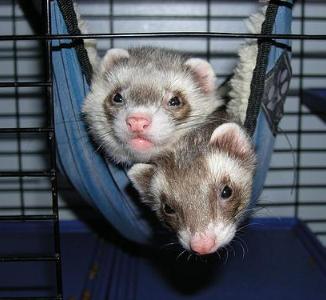Ferret Care
understanding your a pet ferret

Healthy ferret care
Good Ferret Care requires that you get your ferret vaccinated for canine distemper and rabies. The initial canine distemper vaccination requires a series of three shots at 8 weeks 11 and 14 weeks. After the initial series this vaccination is required annually. The rabies vaccine is given initially at 12 weeks of age and annually thereafter. Make sure you find a veterinarian knowledgeable about ferret care to give your pet ferrets their vaccinations and provide other ferret care treatments and advice.
Once vaccinated your ferret pet likely will enjoy good health if, provided with plenty of clean fresh water, a healthy diet, sufficient exercise and a safe, clean cage. Beginning at the age of 3 or 4 years however you need to be alert for two common ferret diseases - insulinoma and adrenal disease. To protect your ferret's health consult your veterinarian about tests for these diseases that can be performed annually to help in early identification. Early diagnosis will give you more treatment options.
Common ailments that may affect your ferret's health include the common cold....Ferrets can catch a human cold so be careful handling your pet if you have a cold. A ferret can die from a cold so seek medical advice immediately if you believe your pet ferret has a cold.
Exposure to temperatures over 80 degrees or extended exposure to bright sunlight can cause heat exhaustion. Always provide your pet with plenty of shade and water to cool off in if they are outside.
Good ferret care practices require you to check regularly for fleas and ticks and ask your vet for suitable remedies if needed.
It is also a good ferret care practice to provide your pet ferret with Laxatone/Petromalt on a weekly basis to avoid hairballs from developing and blocking their gastrointestinal tract.
One medical procedure the American Ferret Association recommends you avoid is the removal to the anal glands. This operation is done with the mistaken belief that removal of the glands will eliminate the ferret's natural musky smell. This is not so. The smell originates from the oils in the fur and removal of the glands does nothing to lessen the musky smell.
Another ferret health care decision you may have to make is whether to spay or castrate your ferret. Most pet store ferrets are spayed or castrated before they are sold. If you buy an intact ferret and are not expecting raising ferrets there are few disadvantages to spay or castrating your ferret. Spaying is usually done before the female or jill reaches sexual maturity at 5 or 6 months of age. Spraying your jill besides avoiding unwanted kittens eliminates the possibility of your pet ferret developing estrogen-induced anemia which can be life threatening. Males or hobs should be castrated before they reach sexual maturity or at 4 months of age. Castrating your hob has the added advantages of making the male ferret friendlier, less aggressive, and more likely to get along with other ferrets. A castrated male is called a hobble.
- Types of ferrets
- Buying Baby Ferrets
- How Ferrets became Pets
- Ferret Facts
- Healthy Ferret Care
- Training a Ferret
- Buying A Ferret
- Multiple Ferrets
- Ferret Neutering
- Housing a ferret
- Litter Tray & Sleeping Area
- Food & Water Dishes
- Collars & Toys
- Ferret Food
- Ferret Heath
- Ferret Vaccinations
- Some Ferret History